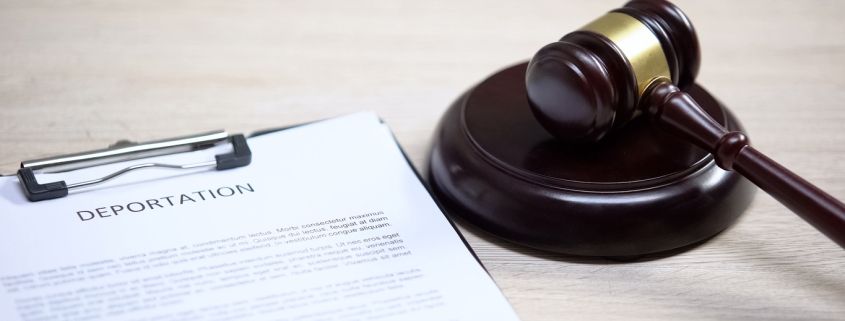When a Person is Deported, Can They Come Back?
A person who has been deported from the United States generally cannot come back immediately. However, under the right conditions, they can return after five, ten, or twenty years, possibly sooner in a limited number of cases. The delay depends on the circumstances of their deportation.
Non-U.S. residents with questions or concerns about deportation can get straightforward answers from a Tampa, FL deportation defense attorney at the Bassey Immigration Law Center. We help individuals in Florida and elsewhere throughout the United States respond to deportation threats and actions and legally return to the United States. You can count on us for full accessibility to your suggestions, questions, and concerns. Schedule an affordable consultation today.
How Long Does a Deported Person Have to Wait Before Returning to the U.S.?
The delay before a deported person can return to the U.S. depends on the circumstances of their deportation:
- A five-year waiting period applies to persons immediately deported when they attempted to enter the U.S. because immigration officials determined they were admissible. A minimum five-year ban also applies to non-residents who do not appear for their scheduled removal hearings.
- A ten-year waiting period applies to persons subject to removal orders issued by an immigration law judge in a hearing before an immigration court.
- A twenty-year waiting period applies to persons who are convicted of an aggravated felony in a state or federal court and to persons who have become subject to more than one removal order. Further, persons who illegally return to the United States before their applicable waiting periods expire will likely be subject to a twenty-year ban.
If you are unsure of the waiting period that applies to your deportation circumstances, contact an immigration attorney for deportation defense, who will review your situation and provide specific information about when you or a family member will be eligible to return to the United States.
Are There Exceptions to the Waiting Periods?
Re-entering the United States after removal or voluntary departure requires meeting strict legal standards, and several factors will determine your eligibility. These include the reason for your prior removal, how much time has passed, your immigration and criminal history, and whether any grounds of inadmissibility apply.
Fortunately, certain waivers—such as Forms I-212 and I-601—may offer relief and allow you to seek lawful re-entry despite past violations. However, they must be carefully prepared and supported with strong evidence.
I-212 Waiver
An I-212 waiver, the Application for Permission to Reapply for Admission into the United States After Deportation or Removal, is specifically required when someone has been previously deported or removed and wishes to lawfully re-enter the U.S. before the mandatory re-entry ban period has passed. It does not waive the underlying grounds of inadmissibility—it only requests permission to apply for re-entry despite a prior removal order.
Common reasons may include prior immigration violations such as unlawful presence in the U.S. for more than 180 days or re-entry after deportation without permission. Additional grounds may include fraud or misrepresentation on immigration applications and health-related issues.
Each of these grounds must be addressed in the I-212 waiver application, with supporting evidence to demonstrate why permission to reapply should be granted.
You must also show evidence of your absence from the U.S. for 10 years since leaving the country. Such evidence may include:
- Copies of exit and exit stamps on your passport from foreign countries
- Proof of residence outside the U.S., such as utility bills in your name
- Employment records from your job outside the U.S.
Form I-601
Form I-601, on the other hand, is the Application for Waiver of Grounds of Inadmissibility. It is used to ask the U.S. government to “forgive” specific grounds of inadmissibility, such as unlawful presence, criminal convictions, fraud, or certain health-related issues.
In some cases, a person may need to file both forms: the I-212 to get permission to reapply after removal and the I-601 to waive the specific reason they are inadmissible. The I-212 deals with re-entry after removal, while the I-601 addresses why someone is inadmissible in the first place.
Form I-192
File Form I-192, the Application for Advance Permission to Enter as a Nonimmigrant, if you are inadmissible to the U.S. but wish to re-enter temporarily under a nonimmigrant visa (such as for tourism, business, or study). This waiver allows certain inadmissible individuals to seek permission to enter the U.S. for a limited period—typically up to one year—despite their inadmissibility, provided they do not intend to immigrate permanently during that time.
Special Circumstances for Re-entry
Under certain circumstances, you may prove eligible for re-entry to the U.S. before your applicable waiting period. These circumstances include:
- Returning as a refugee or asylum seeker: Consult an immigration attorney as to whether it is feasible to reopen your deportation case. If changing conditions in your home country now put you in “reasonable fear” of persecution, filing for asylum is a basis for reopening a deportation case.
- Returning with minor children or spouses: If you are married to or have minor children with U.S. citizenship, you may file Form I-601A, the Application for Provisional Unlawful Presence Waiver. Along with other documentation, you must demonstrate that denying your application would result in “extreme” hardship for your U.S. citizen spouse or children.
In other circumstances, it is possible to reopen your deportation case or have it reconsidered if new evidence is available proving the reasons for your deportation were incorrect. However, this is not an option for the overwhelming majority of deportees.
Call the Bassey Immigration Law Center for Help After a Deportation
For more than 20 years, our attorneys at the Bassey Immigration Law Center in Tampa, Florida, have helped immigrants and their families challenge deportations, secure readmission after deportation, and gain permanent residency status in the United States. Please call us for information on how you or a family member can get back to the U.S. after deportation and for answers to questions you may have about how we can help you with your immigration case.
About Bassey Immigration Law Center, P.A.
Bassey Immigration Law Center, P.A., led by attorney Aniefiok Bassey, provides comprehensive immigration services to individuals, families, and businesses in Florida and beyond. With over 20 years of experience, the firm assists clients with a wide range of immigration matters, from family reunification and green cards to business visas and deportation defense. The diverse, multilingual team is dedicated to supporting clients through the complex immigration process, with a special focus on citizenship, asylum, and LGBTQ+ immigration needs. They offer affordable initial consultations and are committed to delivering personalized, strategic guidance for achieving clients’ immigration goals.



